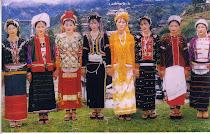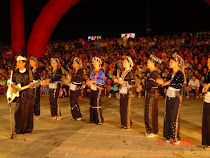ပေလာင္အဖြဲ ့အ စည္းမွ ထုတ္ေ၀ခဲ့ ျပီးေသာ အစီရင္ ခံစာမ်ား
Speak out against the SPDC’s unjust activities against the people’s will In order to gain approved ballots in the Palaung region
http://palaungland.org/?cat=22
“Palaung Working Group Against SPDC’s Referendum” Report of English Language and Burmese language…(Download Report PDF)
We published the “Ballots against People’s Will” report in order to let people know that the referendum result of SPDC was not a legitimate result, and that it is instead a violation of genuine will of the people. This illegitimate ballot was held by Burmese military regime on May 10, 2008.
The Palaung Working Group consists of Palaung State Liberation Front (PSLF), Palaung Youth Network Group (PYNG) and Palaung Women’s Organization (PWO). These organizations oppose the SPDC’s referendum and as a result, carried out the “Vote No Campaigns” and also conducted a Referendum Watch in towns of Numshan, Lashio, Kyauk me, Maingou, Thipaw, Mantong, Namtu, Kutkai, Nankham and Muse Tsp where Palaung people live with the help of responsible patriotic men, women, and youth.
Without any international presence on the referendum, the SPDC was able to control the entire referendum process unfairly. This includes no free and fair concepts of the SPDC’s referendum to ratify the constitution, forced collection of approved ballots, collection of pre-ballots and cheating in ballots. The SPDC also conducted all of the counting of the ballots. The Palaung Working Group is publicizing the unjust conduct of the junta. This report is based on the information which we observed through 57 polling booths, as well as interviews with the local people and polling booth guards.
SPDC exercised dishonest actions in different polling booths and different areas. In some polling booths, even if not all of dishonest means were applied, there were at least four or five methods of dishonesty used in the ballots. It was found that even in some supposedly “free polling booths” at least three methods of dishonest means were applied to get “yes” ballots.
One of the polling booth guards from the Palaung region said, “There were only about 30 percent of eligible voters who could come to the polling booths and have a chance to vote by themself. They wore the Palaung traditional dress and voted, but it was just for show, like fake voting. The rest of the people were included in the list of pre-voting and voting as representatives”.
As an order from the top military regime and according to referendum conducting procedure of the commission, the regime insisted that almost of the ballots had to be ‘yes” votes, even though some urban and defiany citizens have voted “No”.
Therefore we the Palaung Working Group oppose the referendum procedure and urge the people, political forces inside and outside Burma, cease-fire organizations, political parties inside and outside Burma, members of the ASEAN and international community to protest against it as well. We also urge these groups to find a proper solution to the political problem of Burma because the result of the referendum is illegitimate and was gained by cheating the people’s will. It will only lead the country to continue under a dismal and corrupt dictatorship.
Palaung Working Group Against SPDC’s referendum
PSLF, PWO, PYNG
July 3, 2008
Contact: (66) 084 8072 900, (66) 083 3302 304 (66) 085 1075 851
အျပည့္ အစံုဖက္ရန္ ဒီမွာ ဆက္သြားပါ။
—————————————————————————-
Under the Boot: The Burmese army clears the way for Chinese dams on the Shweli River.
http://palaungland.org/?cat=22Download To “Under the Boot of Report”….(English../Burmese../Chinese)
A report titled “Under the Boot,” detailing the implementation of the Shweli dam, China’s first “build-operate-transfer” hydropower project with Burma’s junta, was released on Monday by the Palaung Youth Network Group [Ta’ang. The report said
Burma’s Ministry of Electric Power had formed a joint venture with Yunnan Joint Power Development Company, a consortium of Chinese companies, to build and operate the project.
Electricity generated by the dam would be sent to China and several military-run mining operations in Burma. As the project nears completion, plans are underway for two more dams on the Shweli River, a tributary of the Irrawaddy, the statement said.
Mai Aung Ko of the Palaung Youth Network Group (Ta’ang) said: “This Chinese project has been like a sudden military invasion. The villagers had no idea the dam would be built until the soldiers arrived.”
Local villagers are now suffering land confiscation, forced labor, and
restrictions on their movement, the report said.
One Village’s Cry for Help
Mizzima News (www.mizzima.com)
December 3, 2007 - Man Tat, a Palaung village in Burma’s northern Kachin State and less than 100 kilometers from the Chinese border, was once a peaceful place left largely to its own. Now, with the construction of a 600 megawatt dam across Man Tat’s lifeline, the Shweli River, village life has become almost unbearable.
According to “Under the Boot,” an in-depth look by the Palaung Youth Network Group (PYNG) at the impact dam construction has had on the local community and environment, the Chinese sponsored infrastructure project has negatively impacted the physical and socio-economic security of Man Tat, bringing into doubt the very future of the community.
“Before, the village security was good; no soldiers stayed in the village. But once the dam project started, the soldiers came and everything changed,” laments one resident of Man Tat as quoted in the report, which was released today.
“The loss of lands, resources and livelihoods that in turn impacts nutritional intake, health, and educational opportunities, will impact families for generations,” continues the study.
Construction of the dam and its corresponding infrastructure, which commenced in 2001, has led to documented, widespread human rights abuses, including the incidence of forced labor and uncompensated land reclamation.
“When they took my farm I had to clear another farm plot to subsist and to send my children to school. But just after tilling the new fields, the Chinese company building the conveying tunnel dumped earth onto the fields. After toiling for years on the farm now I’ve had to give up everything because of this dam project,” recounts a despondent villager.
Women are said to live in increased fear due to the threat of gender-based violence at the hands of Burmese army troops that moved into the area to oversee the project’s development.
One of the principle beneficiaries of electricity generated from the hydropower plant is to be mines located to the south and west of Man Tat. Mining sites in Burma are also reported to be hotbeds for rights abuses, as populations are forced to work for little, if any, remuneration and under appalling health and security environments.
A billboard photographed by PYNG and erected not far from the construction site on the Shweli proclaims: “Shweli hydropower station benefits Myanmar people.” Tellingly, the script is written in both English and Chinese, there is no Burmese or local language translation.
PYNG believes that responsible development should prioritize “food supplies, our health, our education, the security of our families and communities, our environment and culture.” Unfortunately, their findings portray a deteriorating situation in each of these categories as a result of the Shweli River dam project.
အျပည့္အစံု ဖက္ရန္ ဒီမွာ ကလိပါ။
————————————————————————-
Poisoned Flowers: The Impacts of Spiraling Drug Addiction on Palaung Women in Burma
Poisoned Flowers: The Impacts of Spiraling Drug Addiction on Palaung Women in Burma (Download Full Report)
A new report by the Palaung Women’s Organization (PWO) details how increased opium production and addiction is devastating Palaung communities in northern Shan State, exposing the failure of drug eradication programs under the military regime in Burma.
“Opium eradication in Burma will only be possible under a democratic government that cares about the welfare of its citizens. It is not possible under a regime that is benefiting from the drug trade,” said Lway Cherry one of the authors of the report.
The report, Poisoned Flowers: The Impacts of Spiraling Drug Addiction on Palaung Women in Burma, based on interviews with eighty-eight wives and mothers of drug addicts, shows how women in Palaung areas have become increasingly vulnerable due to the rising addiction rates. Already living in dire poverty, with little access to education or health care, wives of addicts must struggle single-handedly to support as many as ten children.
ဒီမွာ ဆက္ဖက္ပါ။
skip to main |
skip to sidebar







အခု ဒီအခ်ိန္ ရွိပါျပီ

ျမန္မာ ျပကၡဒိန္ .
ေတာင္ေပၚမွ တဲအိမ္ေလး

လွပတဲ့ တအာင္းမ ေလးမ်ား

တအာင္း(ပေလာင္) ရိုးရာ အကပြဲေတာ္

စိမ္းလန္းတဲ့ လက္ပင္

လၻက္ကို ဖ်ာနဲ ့ လွန္းေနပံု

ေနပူ လွန္းရာမွ ေျခာက္လာေသာ လၻကပံု

